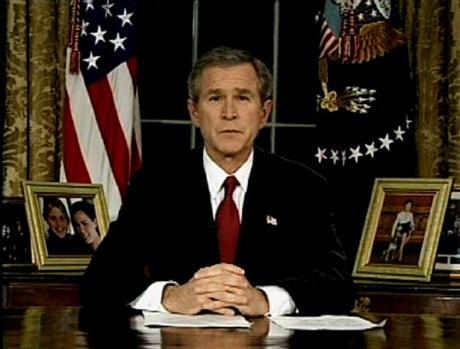
By JIM KUHNHENN
FILE – In this March 19, 2003, file photo President George W. Bush is seen on an image from television, addresses the nation from the Oval Office at the White House, wherein he announced that U.S. forces launched a strike against targets of military opportunity in Iraq. Bush described the action as the opening salvo in an operation to disarm Iraq and to free its people. Ten years ago, Bush urged the American public, the Congress and the international community to believe intelligence assessments that Saddam Hussein’s government possessed weapons of mass destruction, a claim later proved wrong. Now Obama is holding Syrian President Bashar Assad responsible for a reported chemical weapons attack and saying that justifies military action against his regimeamid doubts about whether the evidence is convincing. (AP Photo/via APTN)
WASHINGTON (AP) — The painful legacy of the Iraq war has complicated President Barack Obama’s efforts to muster support for military action against Syria.
As a senator, Obama opposed the Iraq war, and as president, he brought it to a close. But that war’s end did not erase memories of the false premise on which President George W. Bush built a case for the U.S.-led bombing campaign and ground invasion.
Ten years ago, Bush urged the American public, the Congress and the international community to believe intelligence assessments that Saddam Hussein’s government possessed weapons of mass destruction — a claim later proved wrong.
Now Obama is holding Syrian President Bashar Assad responsible for a reported chemical weapons attack and saying that justifies military action against his the Damascus government. But there are doubts about whether the evidence is convincing.
“The well of public opinion was well and truly poisoned by the Iraq episode and we need to understand the public skepticism,” British Prime Minister David Cameron said during Parliament’s debate that led to a stunning and unexpected refusal to endorse military action against Syria.
Cameron and Obama argue that Iraq and Syria are vastly different in both the evidence in hand and the consequences.
Iraq did not possess weapons of mass destruction. In Syria, there is little doubt that civilians were killed by chemical weapons. The question is whether the United States can pin the blame beyond doubt on Assad’s government.
“I recognize that all of us — here in the United States, in Great Britain, in many parts of the world — there is a certain weariness given Afghanistan, there’s a certain suspicion of any military action post-Iraq,” Obama said Friday.
Supporters of Assad’s rule, including Russia, have been quick to point to that history in objecting to any retaliatory strikes against Syria.
“All this is reminiscent of events from a decade ago, when the United States bypassed the U.N. and used fallacious information on the presence in Iraq of weapons of mass destruction to launch an adventure, the consequences of which are known to all,” said Russian foreign ministry spokesman Alexander Lukashevich.
In a declassified intelligence assessment released Friday, the Obama administration held Assad’s government responsible for a chemical weapons attack Aug. 21 on the Damascus suburbs. The assessment said 1,429 people were killed, including at least 426 children.
It cited both human and technological intelligence to conclude that the Syrian government was undertaking activities to deploy chemical weapons three days before the attack. The report cited intercepted communications in which an senior Syrian official, who was not identified, confirmed the use of chemical weapons that day and voiced concern that United Nations inspectors would obtain the evidence.”
The report gave the information a rating of “high confidence,” the strongest short of actual confirmation.
As U.S. officials assembled and double-checked the data, Iraq was not far from their thoughts.
“Our intelligence community has carefully reviewed and re-reviewed information regarding this attack,” Secretary of State John Kerry said Friday. “And I will tell you it has done so more than mindful of the Iraq experience. We will not repeat that moment.”
White House deputy national security adviser Benjamin Rhodes said that for all the focus on comparing judgments in Iraq and Syria over weapons of mass destruction, “the scale of what has been contemplated has been lost as against Iraq.
“You see this rush to compare,” Rhodes said, “and what’s interesting is that there is no outcome in which things look anything like Iraq.”
But even without the intelligence failures preceding the Iraq war, there is an Iraq and Afghanistan war fatigue that has settled over the country that also poses challenges for Obama.
An NBC poll found that nearly 8 in 10 Americans want Obama to obtain congressional approval before using force in Syria. That said, the public is move favorably disposed to a limited cruise missile launch than some other type of intervention, with 50 percent favoring that kind of action and 44 opposing it.
Michael O’Hanlon, a national security analyst at The Brookings Institution, said that for all the contrasts with the 2003 Iraq invasion, the more apt comparison in Syria is with missile strikes ordered against Iraq by President Bill Clinton, including strikes in 1998 to punish Saddam for not complying with U.N. chemical weapons inspections.
“I’m surprised this administration doesn’t make that analogy,” O’Hanlon said. “This operation is going to be limited. It’s going to be small scale or medium scale and it’s going to be over as soon as it’s begun practically. We’re going to hear about the beginning, middle and end of it all in one Pentagon briefing, more or less.”



